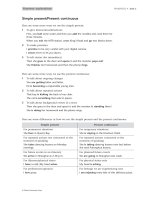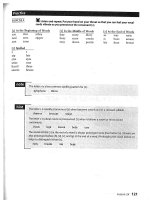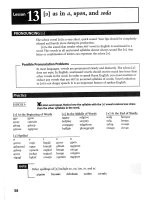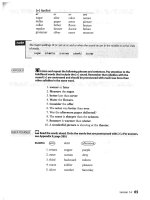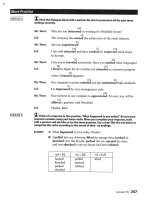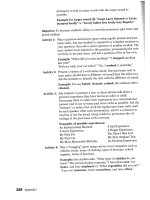Grammar explanations - Simple present/Present continuous potx
Bạn đang xem bản rút gọn của tài liệu. Xem và tải ngay bản đầy đủ của tài liệu tại đây (190.16 KB, 9 trang )
Grammar explanations PROGRESS 4 Unit 1
© Oxford University Press
Simple present/Present continuous
Here are some more ways we use the simple present:
1 To give instructions/directions
First, you boil some water and then you add the noodles and cook them for
three minutes.
When you exit the MTR station, cross King’s Road and go two blocks down.
2 To make promises
I promise to be very careful with your digital camera.
I swear never to let you down.
3 To tell stories (for immediacy)
Then she goes to the door and opens it and the monster pops out!
She finishes her homework and then the phone rings.
Here are some more ways we use the present continuous:
1 To talk about ongoing changes
You are getting fatter and fatter.
He is becoming a responsible young man.
2 To talk about repeated actions
That boy is kicking the back of my chair.
The cat is scratching that sofa to pieces.
3 To talk about background events in a story
Then she goes to the door and opens it and the monster is standing there!
She is doing her homework and the phone rings.
Here are some differences in how we use the simple present and the present continuous:
Simple present Present continuous
For permanent situations For temporary situations
She lives in Quarry Bay. She is staying in the Kowloon Hotel.
For repeated actions not connected to the For repeated actions connected to the
moment of speaking moment of speaking
She takes dancing lessons on Monday She is taking dancing lessons now but before
evenings. she took Putonghua lessons.
For future events in an itinerary For planned future events
We arrive in Shanghai at 2.30 p.m. We are going to Shanghai next week.
For illnesses/physical states For physical states only
I have a cold./My head aches. My head is aching.
For preferences/opinions For feelings we are experiencing now
I love pizza. I am enjoying every bite of this delicious pizza.
Graded grammar worksheets PROGRESS 4 Unit 1
© Oxford University Press 1
Name: _____________________ Class: _____________________ Date: _____________________
Complete the sentences with the correct forms of the verbs in brackets. Use the simple
present or the present continuous tense. (_____ /21 marks)
1 My brother __________________________ (like) this CD very much.
2 He __________________________ (travel) in China this summer.
3 We __________________________ (go) to lunch now. Would you like to join us?
4 We always __________________________ (visit) Grandma on Sundays.
5 In this photo, we __________________________ (play) volleyball on the beach.
6 I __________________________ (play) tennis every day.
7 My father can’t come to the phone now. He __________________________ (take) a shower.
8 My father __________________________ (work) as an accountant in a big company.
9 I think this pen __________________________ (cost) HK$8.
10 I can’t play online games now. My brother __________________________ (use) the computer
to do his homework.
11 A: ______________ you ___________________ (do) your homework now?
B: Yes, I __________________________.
12 This photo was taken when I was three. My father __________________________ (carry) me
on his shoulders.
13 People ______________ always ___________________ (buy) new mobile phones.
14 Can you see Anna? She __________________________ (stand) at the bus stop.
15 ______________ you still ___________________ (watch) TV?
16 A: ______________ they _________________ (go) to Ocean Park on Sunday?
B: No, they __________________________.
17 She often __________________________ (miss) class because of illness.
18 A: ______________ you _________________ (like) Kelly Chan’s songs?
B: Yes, I ______________, but my brother _________________.
Graded grammar worksheets PROGRESS 4 Unit 1
© Oxford University Press T-1
Name: _____________________ Class: _____________________ Date: _____________________
Answers
Complete the sentences with the correct forms of the verbs in brackets. Use the simple
present or the present continuous tense. (_____ /21 marks)
1 My brother __________________________ (like) this CD very much.
2 He __________________________ (travel) in China this summer.
3 We __________________________ (go) to lunch now. Would you like to join us?
4 We always __________________________ (visit) Grandma on Sundays.
5 In this photo, we __________________________ (play) volleyball on the beach.
6 I __________________________ (play) tennis every day.
7 My father can’t come to the phone now. He __________________________ (take) a shower.
8 My father __________________________ (work) as an accountant in a big company.
9 I think this pen __________________________ (cost) HK$8.
10 I can’t play online games now. My brother __________________________ (use) the computer
to do his homework.
11 A: ______________ you ___________________ (do) your homework now?
B: Yes, I __________________________.
12 This photo was taken when I was three. My father __________________________ (carry) me
on his shoulders.
13 People ______________ always ___________________ (buy) new mobile phones.
14 Can you see Anna? She __________________________ (stand) at the bus stop.
15 ______________ you still ___________________ (watch) TV?
16 A: ______________ they _________________ (go) to Ocean Park on Sunday?
B: No, they __________________________.
17 She often __________________________ (miss) class because of illness.
18 A: ______________ you _________________ (like) Kelly Chan’s songs?
B: Yes, I ______________, but my brother _________________.
likes
is travelling
are going
visit
are playing
play
is taking
works
costs
is using
Are
doing
am
is carrying
are buying
is standing
Are watching
Are
going
aren’t/are not
misses
Do
like
do doesn’t/does not
Graded grammar worksheets PROGRESS 4 Unit 1
© Oxford University Press 2
Name: _____________________ Class: _____________________ Date: _____________________
Complete the sentences with the correct forms of the verbs in the simple present or
present continuous tense. You can use some of the verbs from the box more than
once. (_____ /21 marks)
1 My brother __________________________ this CD very much.
2 He __________________________ in China this summer.
3 We __________________________ to lunch now. Would you like to
join us?
4 We always __________________________ Grandma on Sundays.
5 In this photo, we __________________________ volleyball on the beach.
6 I __________________________ tennis every day.
7 My father can’t come to the phone now. He __________________________ a shower.
8 My father __________________________ as an accountant in a big company.
9 I think this pen __________________________ HK$8.
10 I can’t play online games now. My brother __________________________ the computer to do
his homework.
11 A: ______________ you ___________________ your homework now?
B: Yes, I __________________________.
12 This photo was taken when I was three. My father __________________________ me on his
shoulders.
13 People ______________ always ___________________ new mobile phones.
14 Can you see Anna? She __________________________ at the bus stop.
15 ______________ you still ___________________ TV?
16 A: ______________ they _________________ to Ocean Park on Sunday?
B: No, they __________________________.
17 She often __________________________ class because of illness.
18 A: ______________ you _________________ Kelly Chan’s songs?
B: Yes, I ______________, but my brother _________________.
buy stand
carry take
cost travel
do use
go visit
like watch
miss work
play
Graded grammar worksheets PROGRESS 4 Unit 1
© Oxford University Press T-2
Name: _____________________ Class: _____________________ Date: _____________________
Answers
Complete the sentences with the correct forms of the verbs in the simple present or
present continuous tense. You can use some of the verbs from the box more than
once. (_____ /21 marks)
1 My brother __________________________ this CD very much.
2 He __________________________ in China this summer.
3 We __________________________ to lunch now. Would you like to
join us?
4 We always __________________________ Grandma on Sundays.
5 In this photo, we __________________________ volleyball on the beach.
6 I __________________________ tennis every day.
7 My father can’t come to the phone now. He __________________________ a shower.
8 My father __________________________ as an accountant in a big company.
9 I think this pen __________________________ HK$8.
10 I can’t play online games now. My brother __________________________ the computer to do
his homework.
11 A: ______________ you ___________________ your homework now?
B: Yes, I __________________________.
12 This photo was taken when I was three. My father __________________________ me on his
shoulders.
13 People ______________ always ___________________ new mobile phones.
14 Can you see Anna? She __________________________ at the bus stop.
15 ______________ you still ___________________ TV?
16 A: ______________ they _________________ to Ocean Park on Sunday?
B: No, they __________________________.
17 She often __________________________ class because of illness.
18 A: ______________ you _________________ Kelly Chan’s songs?
B: Yes, I ______________, but my brother _________________.
buy stand
carry take
cost travel
do use
go visit
like watch
miss work
play
likes
is travelling
are going
visit
are playing
play
is taking
works
costs
is using
Are
doing
am
is carrying
are buying
is standing
Are watching
Are
going
aren’t/are not
misses
Do
like
do doesn’t/does not
Graded grammar worksheets PROGRESS 4 Unit 1
© Oxford University Press 3
Name: _____________________ Class: _____________________ Date: _____________________
Decide which of the choices below would best complete the article if inserted in the
blanks. Circle the appropriate letters. (_____ /15 marks)
Too Much Fast Food?
According to a recent survey, Hong Kong consumers are (1) more money on convenience
foods since the economic downturn. Because companies are trying to make do with fewer staff,
employees are (2) harder than ever before. More women (3) joining the workforce as well.
They (4) less time to prepare nutritious home-cooked meals for their families. Instead,
families (5) out or (6)
convenience foods, such as frozen pizzas and instant noodles. These
foods (7)
more fat, salt and sugar than home-cooked meals. Experts say that eating too much
of them (8) the risk of serious health problems, including diabetes and heart disease.
However, the trend towards convenience foods (9) benefitting some business sectors.
Supermarkets are (10) to the higher demand for quick, easy-to-serve meals by increasing their
selection of convenience and pre-packaged foods. These products often (11)
for higher
prices than fresh food. Restaurants also (12)
from the trend: most Hong Kong people now
(13) out at least once a day.
Is convenience food just a fad or is home-cooked food (14)
a thing of the past?
How (15)
this trend affecting our health?
1Aspending
B spends
C spent
2Awork
B works
C working
3Ais
B are
C be
4Ahas
B have
C had
5Aeating
B eats
C eat
6Abought
B buys
C buy
7Acontaining
B contains
C contain
8Aincrease
B increasing
C increases
9Ais
B are
C be
10 A respond
B responded
C responding
11 A sells
B sell
C selling
12 A profit
B profiting
C profits
13 A eat
B ate
C were eating
14 A become
B became
C becoming
15 A does
B is
C have
Graded grammar worksheets PROGRESS 4 Unit 1
© Oxford University Press T-3
Name: _____________________ Class: _____________________ Date: _____________________
Answers
Decide which of the choices below would best complete the article if inserted in the
blanks. Circle the appropriate letters. (_____ /15 marks)
Too Much Fast Food?
According to a recent survey, Hong Kong consumers are (1)
more money on convenience
foods since the economic downturn. Because companies are trying to make do with fewer staff,
employees are (2) harder than ever before. More women (3) joining the workforce as well.
They (4)
less time to prepare nutritious home-cooked meals for their families. Instead,
families (5)
out or (6) convenience foods, such as frozen pizzas and instant noodles. These
foods (7)
more fat, salt and sugar than home-cooked meals. Experts say that eating too much
of them (8)
the risk of serious health problems, including diabetes and heart disease.
However, the trend towards convenience foods (9)
benefitting some business sectors.
Supermarkets are (10)
to the higher demand for quick, easy-to-serve meals by increasing their
selection of convenience and pre-packaged foods. These products often (11) for higher
prices than fresh food. Restaurants also (12)
from the trend: most Hong Kong people now
(13)
out at least once a day.
Is convenience food just a fad or is home-cooked food (14) a thing of the past?
How (15)
this trend affecting our health?
1Aspending
B spends
C spent
2Awork
B works
C working
3Ais
B are
C be
4Ahas
B have
C had
5Aeating
B eats
C eat
6Abought
B buys
C buy
7Acontaining
B contains
C contain
8Aincrease
B increasing
C increases
9Ais
B are
C be
10 A respond
B responded
C responding
11 A sells
B sell
C selling
12 A profit
B profiting
C profits
13 A eat
B ate
C were eating
14 A become
B became
C becoming
15 A does
B is
C have
Graded grammar worksheets PROGRESS 4 Unit 1
© Oxford University Press 4
Name: _____________________ Class: _____________________ Date: _____________________
Decide which of the choices below would best complete the article if inserted in the
blanks. Circle the appropriate letters. (_____ /15 marks)
Too Much Fast Food?
According to a recent survey, Hong Kong consumers (1) more money on convenience foods
since the economic downturn. Because companies are trying to make do with fewer staff,
employees (2) harder than ever before. More women (3) the workforce as well.
They (4) less time to prepare nutritious home-cooked meals for their families. Instead,
families (5) out or (6)
convenience foods, such as frozen pizzas and instant noodles.
These foods (7)
more fat, salt and sugar than home-cooked meals. Experts say that eating too
much of them (8) the risk of serious health problems, including diabetes and heart disease.
However, the trend towards convenience foods (9)
some business sectors. Supermarkets
(10)
to the higher demand for quick, easy-to-serve meals by increasing their selection of
convenience and pre-packaged foods. These products often (11)
for higher prices than
fresh food. Restaurants also (12)
from the trend: most Hong Kong people now
(13) out at least once a day.
Is convenience food just a fad or is home-cooked food (14)
a thing of the past?
How is this trend (15)
our health?
1Aare spending
B will spend
C spent
D spends
2Abe working
B are working
C works
D worked
3Ais joining
B are joining
C will join
D joining
4Ahave had
B had
C having
D have
5Abe eating
B eats
C eat
D eaing
6Abought
B buying
C buy
D be buying
7Acontaining
B contains
C contained
D contain
8Aincreased
B increases
C increasing
D increase
9Aare benefitting
B benefitted
C will be
D is benefitting
10 A responding
B are responding
C responds
D will respond
11 A sells
B sell
C selling
D sold
12 A be profiting
B profit
C were profiting
D profits
13 A were eating
B have eaten
C eat
D ate
14 A becoming
B become
C became
D is becoming
15 A affect
B affecting
C affected
D affects
Graded grammar worksheets PROGRESS 4 Unit 1
© Oxford University Press T-4
Name: _____________________ Class: _____________________ Date: _____________________
Answers
Decide which of the choices below would best complete the article if inserted in the
blanks. Circle the appropriate letters. (_____ /15 marks)
Too Much Fast Food?
According to a recent survey, Hong Kong consumers (1)
more money on convenience foods
since the economic downturn. Because companies are trying to make do with fewer staff,
employees (2)
harder than ever before. More women (3) the workforce as well.
They (4)
less time to prepare nutritious home-cooked meals for their families. Instead,
families (5)
out or (6) convenience foods, such as frozen pizzas and instant noodles.
These foods (7) more fat, salt and sugar than home-cooked meals. Experts say that eating too
much of them (8)
the risk of serious health problems, including diabetes and heart disease.
However, the trend towards convenience foods (9)
some business sectors. Supermarkets
(10) to the higher demand for quick, easy-to-serve meals by increasing their selection of
convenience and pre-packaged foods. These products often (11) for higher prices than
fresh food. Restaurants also (12) from the trend: most Hong Kong people now
(13) out at least once a day.
Is convenience food just a fad or is home-cooked food (14) a thing of the past?
How is this trend (15) our health?
1Aare spending
B will spend
C spent
D spends
2Abe working
B are working
C works
D worked
3Ais joining
B are joining
C will join
D joining
4Ahave had
B had
C having
D have
5Abe eating
B eats
C eat
D eaing
6Abought
B buying
C buy
D be buying
7Acontaining
B contains
C contained
D contain
8Aincreased
B increases
C increasing
D increase
9Aare benefitting
B benefitted
C will be
D is benefitting
10 A responding
B are responding
C responds
D will respond
11 A sells
B sell
C selling
D sold
12 A be profiting
B profit
C were profiting
D profits
13 A were eating
B have eaten
C eat
D ate
14 A becoming
B become
C became
D is becoming
15 A affect
B affecting
C affected
D affects


